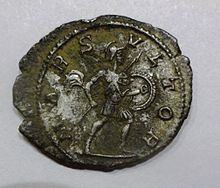Mars (mythology)
Mars (also Mavors, Marmar, Mamers, moreover called Ma(r)spiter) was one of the central gods in ancient Italic religion, especially in Rome. He was later equated with the Greek Ares as a god of war, but differed from the latter in his greater importance and more lively cultic worship; he is, along with Jupiter, the most important Roman god. The names "Ares" and "Mars" may also be etymologically related.
Apart from Rome, Mars was worshipped in numerous places in Italy; the people of Mars even derived their name from him. In Rome, Mars formed a trinity of gods together with Jupiter and Quirinus. In the founding legend of Rome, Mars is the father of the twins Romulus and Remus, and thus progenitor of the Romans. The month of March, originally the first month of the year for the Romans, was dedicated to Mars.
Under Greek influence, mythological tales about the god were also constructed analogous to Ares; according to these, he was the son of Juno; she passed an orchid that was withering and was pregnant with Mars.
Like Ares, Mars was considered the god of war, but certain details in his cult also indicate that he was associated with the flourishing of vegetation as an agricultural deity. The priest of Mars in Rome was the Fleming Martialis; in addition, the Salii Palatini performed cult acts for him. At the festival of Mars (as well as of Quirinus), the dancing priesthood paraded through Rome in ancient warrior dress, singing and dancing. Originally Mars was worshipped outside the city on the Campus Martius, named after him, until Augustus had a temple of Mars Ultor (the "avenger", namely of Caesar's murderers) built on his forum.
In March and October, processions were held in honor of Mars on the Field of Mars. Games in his honor were held on May 12 and August 1. Horses were sacrificed to him on October 15, and cattle at the Suovetaurilia. Mars is said to have appeared in person to the second king of Rome, Numa Pompilius. As the one who went into battle, Mars was called Gradivus. The second Roman god of war, Quirinus, was later sometimes regarded as just another manifestation of Mars.
In the Celtic-Germanic area Mars was identified with numerous native gods. After Mars the originally third (today second) day of the week Martis was called dies ("Day of Mars"), hence Italian martedi, French mardi and Albanian e martë. The Teutons equated it with Tiu, hence German Dienstag.
The attribute of Mars is the lance, he is also shown with helmet and shield as well as sword. The sign of Mars is a circle with an arrow pointing upwards to the right, also known as a symbol of the male sex and masculinity. Sacred to Mars were the wolf, bull, horse, birds of prey, vulture, rooster and woodpecker, as well as the grass. The Latin name Marcus means "consecrated to Mars".
The red planet Mars is named after this god. If something has a clearly martial context, one still speaks today of "martial", i.e. "belonging to the god Mars", which is also where the name Martin comes from.

Mars Ultor on an Antoninian of Alexander Severus, reverse
.jpg)
Statue of Mars Ultor (The Avenger) in the Capitoline Museums in Rome (early 2nd century, originally from the Forum Transitorium).
Search within the encyclopedia